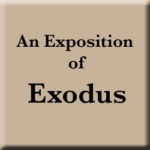
This exposition of Exodus 9:1-35 by Pastor Rod Harris was delivered at Trinity Baptist Church on Sunday morning, August 12, 2018.
Intro:
Proverbs 27:22 speaks of the seemingly indestructible nature of a fool. “Crush a fool in a mortar with a pestle along with crushed grain, yet his folly will not depart from him.”
[sections collapse="always"][section title="Read More"]
No matter how often the fool is battered by the consequences of his folly - he goes right on being a fool. A fool never learns. When you consider the proverb you cannot help but think of Pharaoh. With each new plague the LORD was grinding Pharaoh between the mortar of his justice and the pestle of his wrath, yet he would not yield. Water to blood yet he hardened his heart. An invasion of frogs, yet he would not budge. Man and beast covered with lice yet he would not learn. Swarms of flies covered the land of Egypt to the point the land was “ruined” yet he remained in stubborn unbelief, refusing to yield to God’s demands. What is it going to take? When is he going to learn? How can he be so blind? The same questions could be asked concerning many today. We see the same stubborn refusal. An increasing number in today’s culture turn their backs to God’s demands. The majority refuse to acknowledge the LORD’s authority and even his existence though the heavens declare his glory, though existence of the Jewish people proclaim his faithfulness, and the church and his Word testify of the greatness of his grace. What is it going to take? When will they learn? How can they be so blind?
The story of the Exodus is not just the historical record of what happened 6000 years ago. It is not just the record of what God did back then. It reveals the nature and character of our God. It provides us insight into how God delivers his people. It provides guidance in how we are to continue his work in our own day. This book is living and active. Rather than a relic from a long-dead civilization it is as up-to-date and as relevant as tomorrow’s news! How do we minister to a culture that’s not interested? How do we take the Good News of God’s love and the demands of his holiness to a culture that stubbornly refuses to even listen? We don’t seek out the latest guru, purchase the most recent program or buy into some “innovative” method, we go back to the book. Our text this morning is found in the 9th chapter of Exodus.
Text: Exodus 9:1-35
Remember the big picture: God is sovereignly at work saving a special people for his own glory.
Exodus is the story of redemption.
It is the story of God’s mercy, love and grace.
Because it is the story of redemption it is also the story of God’s holiness and judgment.
Specifically God’s judgment upon an obstinate king and his nation.
Blow after blow the LORD was saying to this stubborn ruler, “I am God. I am Sovereign over all the earth. The Hebrews are not your people, they are my people and I’m telling you let them go that they may serve and worship me!”
We’ve already seen, through the first 4 plagues, how God has demonstrated that he is superior to the gods of Egypt and he is LORD of all. We’ve seen that he distinguished between those who belong to him and those who do not. There were no flies in Goshen, where God’s people lived. Each plague the result of God’s hand, heavy upon Egypt. The stated goal was that all of Egypt would know that the LORD (Yahweh, the God of Israel) is God.
This morning I want to take plagues 5-7 together and I want to draw from them principles about how we are to minister in a culture that’s not interested. How we are to minister the gospel in a culture that stubbornly refuses to acknowledge God’s authority. Oh, there are still many who acknowledge God’s existence. They “believe” in God but it is a god of their own making. They approach the Bible as if it were a cafeteria. “I’ll have some of that, and a little of that…no I don’t like that” it is their own personal religion. By the way that’s not just a description of non-church folk and their approach to God, it is also true of an increasing number of sitting in church pews.
As we look at these 3 plagues we see the same pattern as before. God makes a demand, Pharaoh refuses, there is a judgment and Pharaoh hardens his heart. Let’s take a quick survey of the judgments then I want to draw out those principles.
Plague #5 - Livestock dies (9:1-7)
Plague #6 - Boils (9:8-12)
Plague #7 - Devastating hailstorm (9:13-35)
As we consider these judgments as a whole I think we come away understanding that…
Thesis: Ministry in a culture marked by cynicism, skepticism and rampant unbelief demands biblical faithfulness.
What do I mean by biblical faithfulness? There are three demands of biblical faithfulness I want to pull from this series of judgments.
- Biblical faithfulness demands we declare the whole gospel. (9:1-3, 6, 8-11, 14, 18, 22-25)
- Biblical faithfulness demands our focus be the glory and exaltation of our God. (9:14-16, 29)
- Biblical faithfulness demands that we warn of the danger of false confession. (9:27-30, 34-35)
Conclusion:
This is hard for us in a day on “counting decisions” and keeping stats but being faithful to the Scripture demands we warn of the danger of false confession. Not everyone who says, “Lord, Lord,” is going to enter the kingdom of heaven.
A partial repentance is a worthless repentance.
A hollow repentance is no repentance at all.
A confession of faith without the possession of faith will not do.
These judgments of God serve to reminded us of the need for biblical faithfulness.
Biblical faithfulness demands that we:
- declare the whole gospel
- focus on the glory and exaltation of our God
- warn of the danger of false confession
[/section][/sections]
